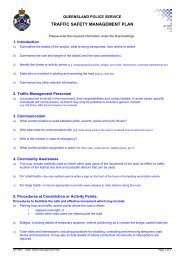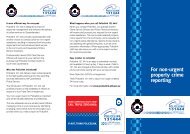Who's chatting to your kids? - Queensland Police Service
Who's chatting to your kids? - Queensland Police Service
Who's chatting to your kids? - Queensland Police Service
Create successful ePaper yourself
Turn your PDF publications into a flip-book with our unique Google optimized e-Paper software.
A MUST READ FOR PARENTS OF CHILDREN WITH INTERNET ACCESS<br />
Who’s <strong>chatting</strong><br />
<strong>to</strong> <strong>your</strong> <strong>kids</strong>?<br />
To report information anonymously <strong>to</strong> police<br />
call Crime S<strong>to</strong>ppers 1800 333 000
Contents<br />
Social networking ................................................................................................ 4<br />
Instant messaging ............................................................................................... 5<br />
Online chatrooms ................................................................................................ 5<br />
3D interactive communities ................................................................................. 6<br />
Mobile telephones ............................................................................................... 7<br />
Sexting ................................................................................................................. 7<br />
Web cameras ....................................................................................................... 9<br />
Online gaming ..................................................................................................... 10<br />
Signs <strong>your</strong> child could be at risk ........................................................................ 11<br />
Suggestions <strong>to</strong> help protect <strong>your</strong> child on the internet ..................................... 13<br />
Family Internet Safety Agreement ...................................................................... 15
Who’s <strong>chatting</strong><br />
The internet has brought the world<br />
in<strong>to</strong> our living rooms providing<br />
access <strong>to</strong> vast resources of<br />
information and the opportunity<br />
<strong>to</strong> meet and communicate with<br />
people from around the world.<br />
But like every element of society,<br />
the internet has its share of<br />
dangers and risks. The internet<br />
and advances in technology have<br />
been embraced by sex offenders<br />
who have proven exceptionally<br />
skilled at exploiting new modes of<br />
communication <strong>to</strong> gain access <strong>to</strong><br />
children.<br />
Like when learning <strong>to</strong> cross the<br />
street, it is important that we<br />
take the time <strong>to</strong> guide, assist and<br />
supervise our children in the use of<br />
the internet.<br />
The rules you teach <strong>your</strong> children<br />
about meeting new people in the<br />
<strong>to</strong> <strong>your</strong> <strong>kids</strong>?<br />
real world also apply when they<br />
meet and ‘chat’ with people online.<br />
Consider for a moment whether<br />
you would feel comfortable if <strong>your</strong><br />
child spoke <strong>to</strong> a <strong>to</strong>tal stranger on<br />
the street for several hours or if the<br />
phone rang at home and <strong>your</strong> child<br />
<strong>to</strong>ld an unknown caller all about<br />
themselves, including their age,<br />
address, school or mobile phone<br />
number. Just as you would tell<br />
<strong>your</strong> children <strong>to</strong> never provide their<br />
personal details <strong>to</strong> someone they<br />
met on the street, you should tell<br />
them never <strong>to</strong> give them <strong>to</strong> anyone<br />
online.<br />
This brochure provides you with<br />
practical information about internet<br />
safety, including the technology<br />
being used by children and how<br />
you can reduce the risk of <strong>your</strong><br />
child becoming a victim.<br />
3
4<br />
Social<br />
Social networking on the internet<br />
allows individual users <strong>to</strong> meet and<br />
connect with other users from around<br />
the world. Recently there has been a<br />
dramatic increase in their popularity<br />
with children due <strong>to</strong> the ease with<br />
which <strong>to</strong> share videos, pho<strong>to</strong>s,<br />
personal messages and chat in real<br />
time with others.<br />
Children feel safe using the internet. If<br />
they are <strong>chatting</strong> <strong>to</strong> people they know<br />
(or think they know) and trust while in<br />
the safety of their own home, they will<br />
often let down their guard or try new<br />
things if it seems popular with their<br />
friends.<br />
Regardless of how safe they feel or<br />
how confident they are, there are<br />
people out there looking for ways <strong>to</strong><br />
target children online. They listen <strong>to</strong><br />
and empathise with children and the<br />
problems they face <strong>to</strong> build rapport<br />
with them. They make themselves<br />
aware of the latest music, movies,<br />
television shows and interests. Some<br />
attempt <strong>to</strong> lower a child’s inhibitions<br />
by slowly introducing sexual context<br />
and content in<strong>to</strong> their conversations,<br />
while others immediately engage in<br />
sexually explicit conversation. Some<br />
will seek a face-<strong>to</strong>-face meeting with<br />
<strong>your</strong> child.<br />
Networking<br />
Social networking sites<br />
Social networking sites are online<br />
communities, some with millions<br />
of members. Many of these sites<br />
contain a profile page where a<br />
child can post personal information<br />
including their name, age, location,<br />
pho<strong>to</strong>graphs, contact details, email<br />
addresses and in some instances<br />
their sexual preference.<br />
Quite often, multiple children are<br />
targeted by preda<strong>to</strong>rs. In many cases<br />
they attempt <strong>to</strong> gain the child’s trust<br />
by pretending <strong>to</strong> be the same age.<br />
Once they have access <strong>to</strong> one child,<br />
they have access <strong>to</strong> the child’s list of<br />
contacts, introducing the offender<br />
<strong>to</strong> their friends who in turn introduce<br />
their friends.<br />
As a parent, it is important <strong>to</strong> be<br />
aware that a child can be identified<br />
and located by a number of methods.<br />
This includes posting information<br />
such as:<br />
• personal details made available<br />
via the internet (including on their<br />
social networking pages and on<br />
their friends pages)<br />
• pho<strong>to</strong>s of themselves wearing<br />
clothing that may identify<br />
their membership of a club,
association or school or taken<br />
in front of an easily identifiable<br />
landmark<br />
• identifying information that a<br />
child’s friend has disclosed<br />
during conversations<br />
• email address distribution lists<br />
(included on group emails).<br />
Instant messaging (IM)<br />
Instant messaging is a program that<br />
can instantly send messages from<br />
one computer <strong>to</strong> another anywhere<br />
in the world. These programs let<br />
children chat one-on-one (or one<strong>to</strong>-many)<br />
with family and friends on<br />
their ‘buddy’ or friends list in real<br />
time. They also allow you <strong>to</strong> send and<br />
receive files, pho<strong>to</strong>s, audio and video<br />
content.<br />
Growing in popularity in recent times,<br />
instant messaging can facilitate web<br />
cam chats (see page 9) or make voice<br />
calls <strong>to</strong> other computers replacing the<br />
need for a telephone.<br />
IM is very similar <strong>to</strong> using email or<br />
SMS messaging and many of the<br />
same safety rules apply. A powerful<br />
communication <strong>to</strong>ol, IM programs<br />
can be direct links between <strong>your</strong> child<br />
and online preda<strong>to</strong>rs.<br />
Some children believe that having<br />
large numbers of contacts or<br />
friends in their ‘buddy’ or friends<br />
list increases their social status.<br />
Investiga<strong>to</strong>rs from the <strong>Queensland</strong><br />
<strong>Police</strong> <strong>Service</strong>’s Taskforce Argos<br />
(targeting online offenders) have<br />
identified children who have over 700<br />
contacts in their buddy list, and in<br />
one investigation arrested five child<br />
sex offenders from one child’s list.<br />
It is important that <strong>your</strong> child<br />
personally knows everyone on their<br />
contact list prior <strong>to</strong> <strong>chatting</strong> with<br />
them. They should be able <strong>to</strong> tell you<br />
each person’s real name and how<br />
they came <strong>to</strong> know them.<br />
Online chat rooms<br />
These programs allow users <strong>to</strong><br />
select a “room” based on a particular<br />
interest or <strong>to</strong>pic of conversation and<br />
allows them <strong>to</strong> chat instantly with<br />
others (using both voice and text<br />
chat). Chat rooms have proven <strong>to</strong> be<br />
a dangerous destination for children<br />
in the past due <strong>to</strong> the large number<br />
of preda<strong>to</strong>rs actively using them.<br />
Children’s <strong>to</strong>pics are often mixed<br />
in with adult conversation or <strong>to</strong>pics<br />
(many unsuitable for children). These<br />
types of internet communication<br />
platforms should be avoided by<br />
children or strictly moni<strong>to</strong>red by<br />
5
6<br />
parents due <strong>to</strong> the high degree of risk<br />
associated with them.<br />
Be aware that it is easy for preda<strong>to</strong>rs<br />
<strong>to</strong> pretend they are children by<br />
creating a child’s profile and building<br />
rapport during chat with <strong>your</strong> child.<br />
The preda<strong>to</strong>r will then request the<br />
child transfer <strong>to</strong> an instant messaging<br />
application in order for them <strong>to</strong> web<br />
cam, swap pictures and continue the<br />
grooming process.<br />
3D interactive communities<br />
These types of internet platforms<br />
allow users <strong>to</strong> create three<br />
dimensional (3D) characters of their<br />
choice known as ‘avatars’. They<br />
can interact as that character in a<br />
virtual world with thousands of other<br />
‘avatars’ created by users from<br />
around the globe.<br />
The risks associated with these sites<br />
include:<br />
• Users cannot be sure of who<br />
they are interacting with (actual<br />
identities, ages, genders, etc)<br />
• Adult preda<strong>to</strong>rs can disguise<br />
themselves as child characters <strong>to</strong><br />
communicate with children<br />
• There is the potential for children<br />
<strong>to</strong> view sexually explicit material.<br />
Speak with <strong>your</strong> child about the<br />
risks associated with representing<br />
themselves online. If <strong>your</strong> child<br />
creates a child avatar, they increase<br />
their chances of being targeted by<br />
preda<strong>to</strong>rs.<br />
Tips for parents with children<br />
engaged in social networking:<br />
• Choose a non identifiable, non<br />
gender specific username<br />
• Never give out any personal<br />
information whilst using IM or<br />
other networking programs.<br />
This includes their real name,<br />
telephone or mobile phone<br />
number, mailing address,<br />
passwords or banking details<br />
• Never accept a friend, file or<br />
download from a person you<br />
don’t know, this includes links <strong>to</strong><br />
a website<br />
• Know how <strong>to</strong> save copies of <strong>your</strong><br />
child’s IM conversations.
Mobile<br />
Today many children are provided<br />
with mobile phones by parents as<br />
a way of maintaining contact in<br />
emergency situations.<br />
Internet preda<strong>to</strong>rs are constantly<br />
looking for ways <strong>to</strong> facilitate direct<br />
contact with children and on many<br />
occasions obtain children’s mobile<br />
phone numbers during online<br />
chats with them. They will search<br />
the internet for children’s profiles<br />
containing a mobile telephone<br />
number or personal information.<br />
Child sex offenders have been<br />
known <strong>to</strong> send mobile telephones <strong>to</strong><br />
children as gifts. This gesture is part<br />
of the grooming process, and can<br />
result in the child feeling indebted<br />
<strong>to</strong> the preda<strong>to</strong>r. In some cases, they<br />
have paid the child’s telephone bills<br />
Phones<br />
<strong>to</strong> ensure that communication can<br />
continue without the knowledge of<br />
the child’s parents.<br />
Of significant concern are the next<br />
generation mobile telephones<br />
that include features such as<br />
satellite navigation, web access,<br />
video and still cameras and GPS<br />
(global positioning system) location<br />
capability.<br />
Sexting<br />
A concerning new development is the<br />
activity called ‘sexting’. This involves<br />
children using their mobile phones<br />
<strong>to</strong> take and send sexually explicit<br />
images of themselves <strong>to</strong> their friends<br />
or <strong>to</strong> other people. This practice has<br />
increased in recent times due <strong>to</strong><br />
improvements in the technology of<br />
mobile phones which now contain<br />
camera and video capability.<br />
Of significant concern is the material<br />
they post or send can be very easily<br />
and widely circulated, of which<br />
the origina<strong>to</strong>r has no control. The<br />
images can be sent <strong>to</strong> other people<br />
from the child’s school, sporting<br />
club or employer and be potentially<br />
embarrassing <strong>to</strong> them and their<br />
families in the future. Once this<br />
material has been circulated and<br />
made available on the internet, it is<br />
impossible <strong>to</strong> remove.<br />
7
8<br />
Children should be made aware that<br />
they are committing serious criminal<br />
offences by taking, possessing or<br />
sending these types of images and<br />
may be liable <strong>to</strong> prosecution.<br />
Tips for parents of children<br />
with mobile phones:<br />
• Choose a mobile phone for<br />
<strong>your</strong> child that does not feature<br />
internet access, or alternatively<br />
speak with <strong>your</strong> carrier <strong>to</strong> block<br />
internet access. All carriers<br />
provide this service<br />
• Talk <strong>to</strong> <strong>your</strong> carrier about<br />
blocking services that are not<br />
required on <strong>your</strong> child’s phone.<br />
While GPS and other features<br />
can be useful, consider the<br />
implications of a complete<br />
stranger being able <strong>to</strong> pinpoint<br />
the exact location of <strong>your</strong> child.<br />
Blocking or restricting services<br />
can include the opportunity <strong>to</strong><br />
limit incoming and outgoing<br />
calls, text, instant messaging and<br />
picture messages<br />
• Moni<strong>to</strong>r <strong>your</strong> child’s telephone<br />
usage and be wary of gifts <strong>your</strong><br />
child receives from unfamiliar<br />
people, particularly mobile<br />
phones<br />
• Consider setting strict guidelines<br />
regarding <strong>your</strong> child’s use of the<br />
phone. For example, advise <strong>your</strong><br />
child <strong>to</strong> use the mobile phone for<br />
emergencies and calls <strong>to</strong> home<br />
only<br />
• Consider purchasing a pre-paid<br />
SIM card (available from <strong>your</strong><br />
carrier) that strictly limits the use<br />
of the phone – once the limit is<br />
reached the phone card needs <strong>to</strong><br />
be re-charged with credit<br />
• Talk <strong>to</strong> <strong>your</strong> child about the<br />
appropriate use of camera<br />
phones. If <strong>your</strong> child has<br />
a camera phone then it is<br />
important you set some<br />
guidelines for its use, including<br />
when taking pho<strong>to</strong>s of others.<br />
Ask <strong>your</strong> child <strong>to</strong> let you<br />
know if anyone else’s use of a<br />
camera phone makes them feel<br />
uncomfortable<br />
• Stress the importance of not<br />
responding <strong>to</strong> any messages<br />
from unknown people. If <strong>your</strong><br />
child receives persistent calls<br />
or messages from an unknown<br />
person, you should report it<br />
<strong>to</strong> the police, taking note of<br />
the number and saving any<br />
messages or pictures on the<br />
mobile handset.
Web<br />
Cameras<br />
Web cameras (web cams) can be<br />
connected <strong>to</strong> almost any home<br />
computer. They are regularly used<br />
<strong>to</strong> capture and send images or<br />
live video stream whilst <strong>chatting</strong><br />
<strong>to</strong> other internet users. If operated<br />
appropriately, they are a great way<br />
<strong>to</strong> stay in contact with family and<br />
friends.<br />
It is important <strong>to</strong> understand that<br />
web cams can take on a variety<br />
of forms. Technological advances<br />
have enabled many other devices<br />
<strong>to</strong> be used for this purpose,<br />
including digital cameras, phones<br />
or gaming devices connected <strong>to</strong><br />
gaming consoles. Some of the<br />
latest generation of lap<strong>to</strong>ps have<br />
web cams built in<strong>to</strong> the moni<strong>to</strong>r<br />
screen.<br />
Preda<strong>to</strong>rs seek out and chat <strong>to</strong><br />
children with web cams and can<br />
place enormous pressure on them<br />
(even blackmail them) <strong>to</strong> transmit<br />
indecent images of themselves. It<br />
is also very common for preda<strong>to</strong>rs<br />
<strong>to</strong> use web cameras <strong>to</strong> transmit<br />
images of themselves performing<br />
sex acts.<br />
Once a child has transmitted<br />
an indecent image across the<br />
internet, that image can be<br />
saved or uploaded <strong>to</strong> the internet<br />
for public viewing. It is all but<br />
impossible <strong>to</strong> remove the image as<br />
it can be copied and downloaded<br />
often hundreds of thousands of<br />
times.<br />
Parents should carefully consider<br />
the implications of allowing their<br />
children <strong>to</strong> have unsupervised<br />
access <strong>to</strong> web cameras.<br />
9
10<br />
Online<br />
The popularity of electronic and<br />
video games amongst children has<br />
increased dramatically over the last<br />
few years. Advances in technology<br />
have meant these devices can be<br />
used for a variety of purposes.<br />
Parents should be aware that many<br />
gaming devices can now connect<br />
<strong>to</strong> the internet or feature built-in<br />
web cameras. Some devices even<br />
provide online chat capability<br />
enabling anyone (including<br />
preda<strong>to</strong>rs) <strong>to</strong> communicate with<br />
<strong>your</strong> child.<br />
Preda<strong>to</strong>rs have been known <strong>to</strong><br />
pretend <strong>to</strong> be a child in order <strong>to</strong><br />
game and then chat with <strong>your</strong><br />
Gaming<br />
child. Once a friendship has been<br />
established, they can request <strong>to</strong><br />
take the conversation <strong>to</strong> another<br />
internet chat or networking site.<br />
You should investigate what<br />
internet/chat capabilities <strong>your</strong><br />
child’s devices have and decide<br />
whether they require these facilities.<br />
It is <strong>your</strong> decision whether <strong>to</strong> set<br />
the available electronic parental<br />
controls on these devices or <strong>to</strong><br />
disconnect these capabilities.
Signs <strong>your</strong> child<br />
You find pornography on <strong>your</strong><br />
child’s computer.<br />
Child sex offenders may use<br />
pornography as part of the process<br />
<strong>to</strong> facilitate open sexual discussion.<br />
It may also be used <strong>to</strong> show the child<br />
that sex between children and adults<br />
is acceptable and normal.<br />
Your child is receiving phone<br />
calls from people you don’t know<br />
or is calling numbers you don’t<br />
recognise.<br />
It is very common for a child sex<br />
offender <strong>to</strong> attempt <strong>to</strong> speak directly<br />
<strong>to</strong> a child they have met online.<br />
Investigations <strong>to</strong> date have proven<br />
that most want <strong>to</strong> talk <strong>to</strong> the child<br />
on the telephone for the purpose of<br />
setting up an actual meeting. While<br />
<strong>your</strong> child may be hesitant <strong>to</strong> give out<br />
<strong>your</strong> home phone number, the sex<br />
offender will give out theirs. If you do<br />
could be at risk<br />
not have a silent number and <strong>your</strong><br />
child calls, the offender can easily<br />
obtain <strong>your</strong> number using the ‘caller<br />
ID’ function on their telephone.<br />
Your child is spending excessive<br />
amounts of time on the internet.<br />
The longer <strong>your</strong> child is online, the<br />
higher the likelihood that they will be<br />
approached inappropriately, or be<br />
exposed <strong>to</strong> objectionable material.<br />
While exploring the internet can be a<br />
valuable experience, parents should<br />
consider moni<strong>to</strong>ring the amount of<br />
time children spend online. Children<br />
are at greatest risk from online sexual<br />
preda<strong>to</strong>rs in the evening, during<br />
weekends and on school holidays.<br />
Research by investiga<strong>to</strong>rs at Task<br />
Force Argos has shown that some<br />
offenders are online for up <strong>to</strong> 16<br />
hours at a time. Be aware that visi<strong>to</strong>rs<br />
<strong>to</strong> chat rooms are from across the<br />
world, not just Australia.<br />
When you enter the room <strong>your</strong><br />
child changes the screen or turns<br />
the computer off.<br />
If <strong>your</strong> child is engaged in<br />
inappropriate conversation or is<br />
looking at pornographic images it is<br />
likely that they will attempt <strong>to</strong> hide this<br />
from you.<br />
11
12<br />
Your child is receiving gifts or<br />
mail from people you don’t know.<br />
Child sex offenders use many<br />
strategies <strong>to</strong> gain the confidence<br />
and trust of a child. Investigations<br />
conducted by officers from<br />
Taskforce Argos have identified<br />
that some individuals gradually<br />
seduce children through the use<br />
of attention, affection and gifts.<br />
They will send letters and gifts<br />
as part of this process and some<br />
will pay for flights so the child can<br />
meet them.<br />
Your child is becoming<br />
withdrawn or displaying<br />
irregular personality<br />
characteristics.<br />
Child sex offenders are adept<br />
at gaining the confidence of<br />
children, providing <strong>your</strong> child with a<br />
sympathetic and comforting ear, and<br />
turning insignificant family problems<br />
in<strong>to</strong> major issues in order <strong>to</strong> gain the<br />
affection of <strong>your</strong> child. Children may<br />
also become withdrawn after sexual<br />
victimisation.<br />
With little or no parental supervision<br />
and a willing child, it is easier for<br />
preda<strong>to</strong>rs <strong>to</strong> form strong relationships<br />
with children online. <strong>Police</strong> have<br />
observed occasions when children<br />
claim they are ‘in love’ with the<br />
preda<strong>to</strong>r, even after the preda<strong>to</strong>rs<br />
true age is revealed.<br />
It is important for parents <strong>to</strong> note<br />
that some children do actively seek<br />
and participate in sexually explicit<br />
conversation and have on occasions<br />
voluntarily met with the adult preda<strong>to</strong>r<br />
<strong>to</strong> engage in sexual contact.
Suggestions<br />
• Having direct and open<br />
communication with <strong>your</strong><br />
child, taking the time <strong>to</strong> sit<br />
down with them and discussing<br />
their use of the internet is<br />
the most important step <strong>to</strong><br />
protecting them online. Having<br />
open lines of communication<br />
allows <strong>your</strong> child <strong>to</strong> talk <strong>to</strong> you<br />
freely and approach you when<br />
something is wrong.<br />
• Be aware of the programs<br />
and files on <strong>your</strong> computer.<br />
If you don’t feel you have<br />
the knowledge or technical<br />
ability <strong>to</strong> do this, ask a<br />
friend, colleague or qualified<br />
technician.<br />
• Spend time exploring the<br />
internet with <strong>your</strong> children, and<br />
let them teach you about<br />
their favourite web sites,<br />
including the social networking<br />
and instant messaging sites<br />
they use.<br />
• Take the time <strong>to</strong> view <strong>your</strong><br />
child’s online profile and check<br />
for information that may<br />
<strong>to</strong> help protect <strong>your</strong><br />
child on the internet<br />
be unsafe, including email<br />
addresses, information about<br />
their membership of any other<br />
networking sites, unacceptable<br />
pho<strong>to</strong>s or any other information<br />
of concern.<br />
• Keep the computer in a room<br />
the whole family accesses,<br />
not in <strong>your</strong> child’s bedroom.<br />
Opportunities for exploitation<br />
by a sexual preda<strong>to</strong>r are limited<br />
if the computer moni<strong>to</strong>r is<br />
visible <strong>to</strong> all members of the<br />
family.<br />
• Taskforce Argos has developed<br />
the “Family Internet Safety<br />
Agreement”, a contract you<br />
agree upon with <strong>your</strong> child.<br />
The document sets out agreed<br />
rules of internet use with<br />
<strong>your</strong> child and is available at<br />
the back of this booklet and on<br />
the <strong>Queensland</strong> <strong>Police</strong> <strong>Service</strong><br />
website (www.police.qld.gov.<br />
au). If this does not meet <strong>your</strong><br />
needs, sit down with <strong>your</strong><br />
family and develop <strong>your</strong> own<br />
set of guidelines.<br />
13
14<br />
• Consider installing filtering<br />
and/or computer blocking<br />
software provided by <strong>your</strong><br />
internet service provider.<br />
The Netalert web page (a<br />
Government run organisation)<br />
provides information on a<br />
number of commercially<br />
available products (www.<br />
netalert.gov.au).<br />
• Ensure you are able <strong>to</strong> access<br />
<strong>your</strong> child’s email and randomly<br />
check its contents. Remember<br />
they may also be a member of<br />
free email accounts other than<br />
the one provided by <strong>your</strong> internet<br />
service provider.<br />
• Consider approaching <strong>your</strong><br />
telephone service provider<br />
<strong>to</strong> discuss options they may be<br />
able <strong>to</strong> provide <strong>to</strong> ensure <strong>your</strong><br />
privacy and security.<br />
• It is important <strong>to</strong> remember<br />
<strong>your</strong> child may be accessing the<br />
internet from other locations.<br />
Enquire with <strong>your</strong> child’s school,<br />
public library or anywhere you<br />
believe <strong>your</strong> child uses the<br />
internet <strong>to</strong> ascertain what<br />
safety measures they have in<br />
place.<br />
Important points <strong>to</strong> discuss with<br />
<strong>your</strong> children:<br />
• Do not send pictures of<br />
themselves <strong>to</strong> someone they<br />
don’t know and never place a full<br />
profile and picture of themselves<br />
anywhere on the internet<br />
• Never give out personal<br />
information including their name,<br />
home address, phone number or<br />
school<br />
• Never arrange a face <strong>to</strong> face<br />
meeting with someone they<br />
have only engaged with on the<br />
internet.<br />
If any of the following situations<br />
occur, you should immediately<br />
contact <strong>your</strong> local police station:<br />
• Your child or anyone in the<br />
household has received child<br />
exploitation material<br />
• Your child has been sexually<br />
solicited<br />
• Your child has received sexually<br />
explicit images.<br />
If any of these scenarios occur, keep<br />
<strong>your</strong> computer turned off in order <strong>to</strong><br />
preserve evidence.
Remember,<br />
ultimately <strong>your</strong> child’s<br />
safety rests with you.
A must read for parents<br />
of children with internet access<br />
To report information <strong>to</strong> police call<br />
Crime S<strong>to</strong>ppers 1800 333 000<br />
<strong>Queensland</strong> <strong>Police</strong> <strong>Service</strong><br />
Telephone 3364 6464<br />
Task Force Argos, State Crime Operations Command<br />
Telephone 3364 4142<br />
Life threatening emergencies<br />
or crime in progress call Triple Zero (000)<br />
www.police.qld.gov.au<br />
For further information on how <strong>to</strong> enjoy the internet safely visit the Australian<br />
Communications and Media Authority web site http://www.cybersmart.gov.au and<br />
The Australian Internet Safety Advisory Board web site http://www.netalert.gov.au.<br />
Supported by the Community Safety and Crime Prevention Branch, Operations Support Command.<br />
QPS Vision Statement<br />
We are determined <strong>to</strong> be a professional police service, dedicated <strong>to</strong> excellence<br />
and committed <strong>to</strong> working in partnership with the people of <strong>Queensland</strong> <strong>to</strong> enhance the safety<br />
and security of our community.

















